Impact of Social Media on Teenagers and Adolescents
- Last Updated: June 12th, 2025

Attorney Jessie Paluch, founder of TruLaw, has over 25 years of experience as a personal injury and mass tort attorney, and previously worked as an international tax attorney at Deloitte. Jessie collaborates with attorneys nationwide — enabling her to share reliable, up-to-date legal information with our readers.
Legally Reviewed
This article has been written and reviewed for legal accuracy and clarity by the team of writers and legal experts at TruLawsuit Info and is as accurate as possible. This content should not be taken as legal advice from an attorney. If you would like to learn more about our owner and experienced injury lawyer, Jessie Paluch, you can do so here.
Fact-Checked
TruLawsuit Info does everything possible to make sure the information in this article is up to date and accurate. If you need specific legal advice about your case, contact our team by using the chat on the bottom of this page. This article should not be taken as advice from an attorney.
Key Takeaways:
- Social media offers youth increased connectivity and enhanced learning opportunities but also carries risks like cyberbullying, addiction, and negative impacts on mental health and body image
- Parents and educators play a vital role in promoting healthy social media habits among adolescents through digital literacy education, monitoring usage, and modeling positive online behavior.
- Longitudinal studies on the long-term effects of social media and the development of age-appropriate usage guidelines are needed to inform future research, policies, and resources that protect young users.
Overview of the Impact of Social Media
On this page, we’ll discuss the impact of social media on teenagers and adolescents, negative effects of excessive social media use, potential links between social media and mental health issues, and much more.
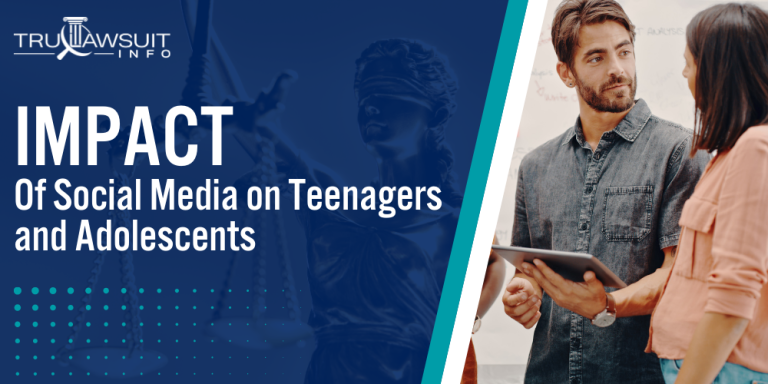
Intro to the Impact of Social Media
Some of the key aspects of the Impact of Social Media include, but are not limited to:
- Mental Health: Excessive social media use has been linked to various mental health issues, such as depression, anxiety, and low self-esteem.
- Addiction: Social media can be addictive, leading to compulsive use that interferes with daily life and relationships.
- Social Comparison: Constant exposure to idealized images and lifestyles on social media can lead to feelings of inadequacy and negative self-comparison.
- Sleep Disruption: Late-night social media use can disrupt sleep patterns, leading to fatigue and other health issues.
If you or a loved one has suffered negative impacts due to social media use, you may be eligible to seek compensation.
Contact TruLawsuit Info using the chat on this page for an instant case evaluation to determine if you qualify to join others filing social media harm lawsuits.
Table of Contents
Positive Effects of Social Media on Youth
Social media has woven itself into the fabric of many young people’s lives, offering both opportunities for increased connectivity and an enhanced landscape for emotional learning.
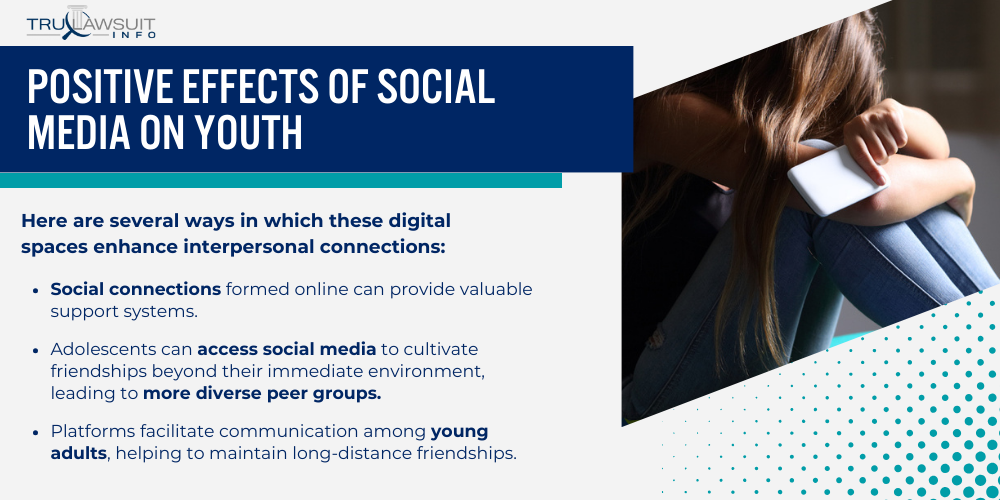
When used mindfully, it can contribute significantly to the personal and educational development of adolescents.
Increased Connectivity and Communication
Social media platforms have fundamentally transformed how youth forge and maintain relationships.
Here are several ways in which these digital spaces enhance interpersonal connections:
- Social connections formed online can provide valuable support systems.
- Adolescents can access social media to cultivate friendships beyond their immediate environment, leading to more diverse peer groups.
- Platforms facilitate communication among young adults, helping to maintain long-distance friendships.
- Utilizing social media can raise awareness on various issues, enabling users to mobilize around causes they care about.
Enhanced Learning Opportunities and Access to Information
The digital age has made information more reachable for young individuals than ever before.
Here’s how social media contributes to educational and informational growth for youth:
- Young people can use social media sites to exchange academic materials and discuss educational content.
- Learning through platforms like YouTube or educational blogs can supplement traditional education methods.
- Social media provides a medium to share experiences and insights regarding youth experiencing poor mental health, promoting openness and understanding.
- According to the Pew Research Center, most adolescents who utilize these platforms are exposed to a variety of viewpoints and cultures, which can enhance their worldviews and knowledge base.
Negative Consequences of Social Media Use
Social media’s impact on society has a dark side, with certain positive aspects raising serious concerns about users’ mental and social well-being.
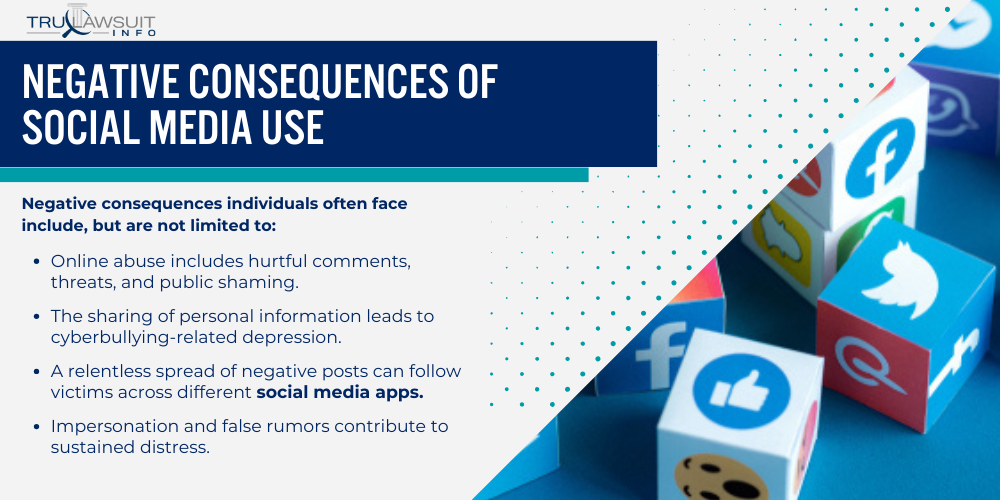
Cyberbullying and Online Harassment
Cyberbullying has emerged as a persistent negative factor in the online lives of many social media users.
Individuals often face:
- Online abuse includes hurtful comments, threats, and public shaming.
- The sharing of personal information leads to cyberbullying-related depression.
- A relentless spread of negative posts can follow victims across different social media apps.
- Impersonation and false rumors contribute to sustained distress.
Cyberbullying not only affects an individual’s mental health but can also have long-lasting effects on their real life.
Decreased Face-to-Face Interaction and Social Skills
Regular social media usage can ironically lead to a decrease in real-world social skills.
Due to social media’s pervasive nature:
- Some individuals may experience social anxiety when engaging in face-to-face interactions.
- They might prioritize online communication, leading to fewer real-life social encounters.
- There is an observable deficit in developing and maintaining non-verbal communication skills.
- A pattern of avoiding direct contact with others can emerge, favoring digital communication.
Social skills are vital for communication and relationships, and the decrease in their use signifies a troubling trend tied to extensive social media usage.
Social Media Addiction and Mental Health
Social media addiction is increasingly scrutinized for its link to mental health issues, with particular emphasis on its prevalence among teens and the potential for fostering feelings of depression, anxiety, and low self-esteem.
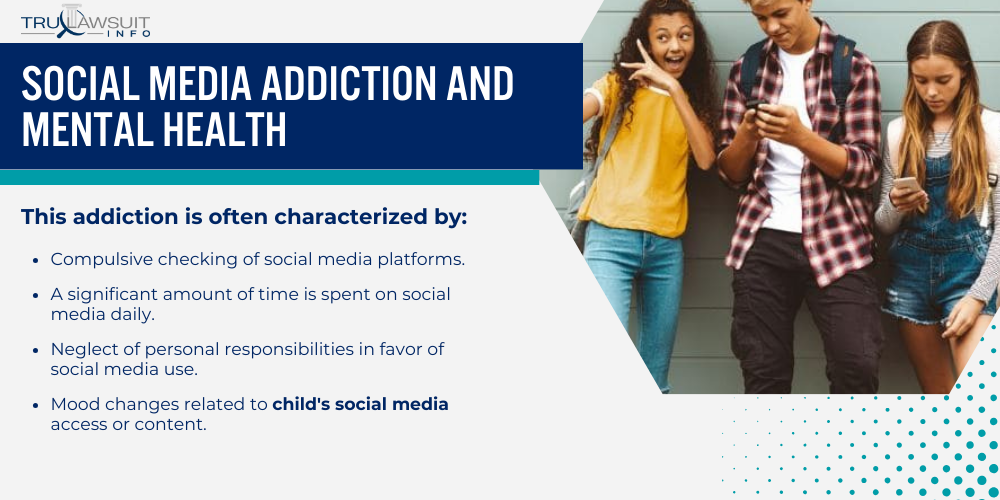
Prevalence of Social Media Addiction Among Teens
The rise of social media has led to a significant increase in its use by teenagers, many of whom exhibit signs of addictive behavior.
This addiction is characterized by:
- Compulsive checking of social media platforms.
- A significant amount of time is spent on social media daily.
- Neglect of personal responsibilities in favor of social media use.
- Mood changes related to child’s social media access or content.
Links Between Social Media Use and Depression, Anxiety, and Low Self-Esteem
Social media use is commonly linked to various mental health issues.
The potential impacts include:
- Depression is related to negative comparisons with others or feelings of inadequacy.
- Anxiety stems from the pressure to maintain a certain image or from cyberbullying.
- Low self-esteem is often a result of negative social comparison and not receiving expected feedback or validation.
- Poor sleep quality linked to late-night usage disrupts sleep patterns, which can further exacerbate mental health problems.
The influence of ‘likes’ and positive feedback on social media on the brain’s reward center can affect an individual’s impulse control and may contribute to more frequent social media use.
Moreover, certain adolescent social media habits can become ingrained and problematic, similar to a mental health condition.
It is important to recognize these patterns and consider their influence on overall well-being.
Influence of Social Media on Body Image
The effects of social media on body image can be significant, shaping how individuals perceive themselves and their self-worth.
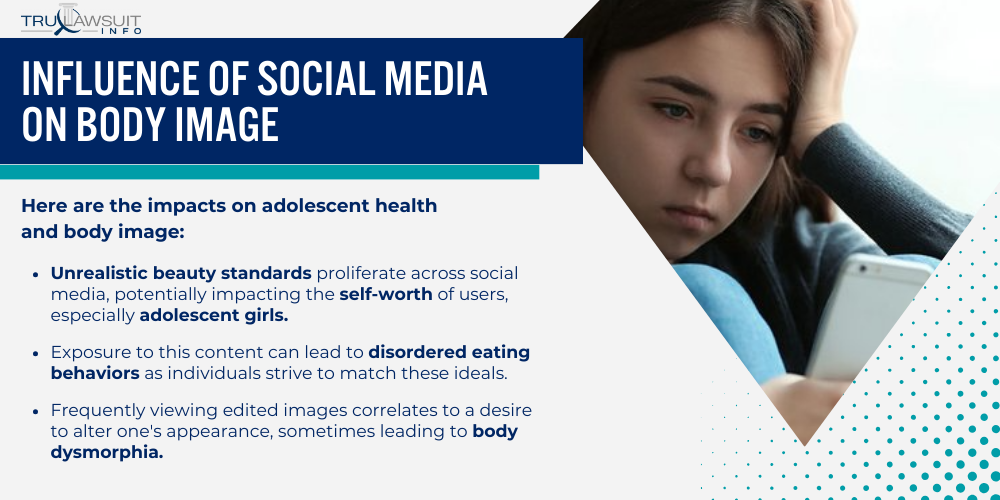
Two primary concerns include exposure to edited images that promote unrealistic beauty standards and the potential to increase the risk of serious mental health issues, such as eating disorders.
Exposure to Unrealistic Beauty Standards and Edited Images
Social media platforms often showcase imagery promoting beauty ideals that may be unattainable or only achievable through digital alteration.
Here are the impacts on adolescent health and body image:
- Unrealistic beauty standards proliferate across social media, potentially impacting the self-worth of users, especially adolescent girls.
- Exposure to this content can lead to disordered eating behaviors as individuals strive to match these ideals.
- The frequent viewing of edited images correlates to a desire to alter one’s appearance, sometimes leading to body dysmorphia.
- Research indicates a link between adolescent social media use and dissatisfaction with one’s body, particularly after viewing beauty and fitness posts.
Increased Risk of Eating Disorders and Body Dysmorphia
Social media’s influence reaches far into personal perceptions of health and beauty, presenting significant challenges concerning eating disorders and body dysmorphia among adolescents.
Consider the following effects:
- Prolonged exposure to content depicting so-called ‘ideal’ body types can lead to unhealthy comparisons and disordered eating behaviors.
- Particular health outcomes can be adversely affected as adolescent girls in particular may develop a distorted view of what a healthy body looks like.
- Engagement with certain types of content has been associated with higher rates of eating disorders among social media users.
- There is a growing concern about the impact of ‘fitspiration’ and diet culture prevalent on social media platforms leading to problematic body image perception.
Impact of Social Media on Academic Performance
Social media’s influence on education involves both distractions and opportunities for enhanced learning.
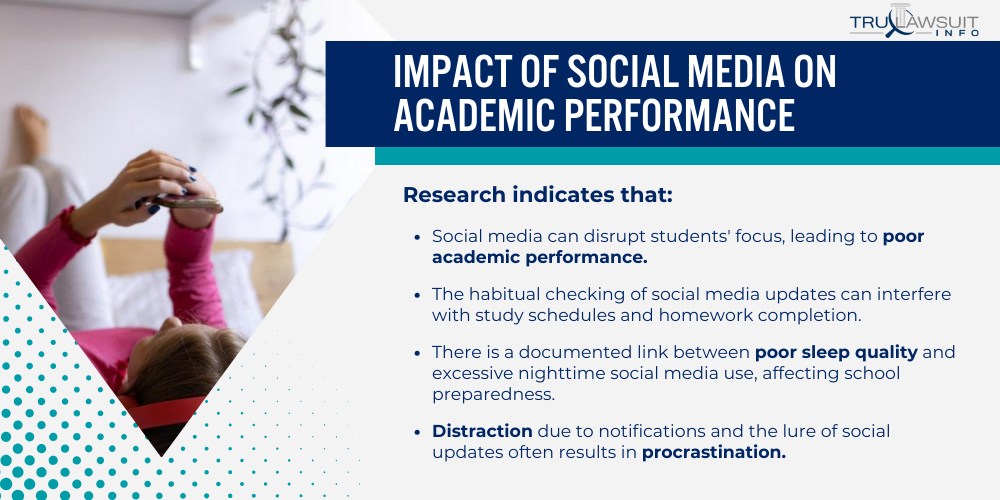
It’s essential to examine how platforms can lead to procrastination yet also foster collaborative learning environments.
Distraction and Procrastination Due to Social Media Use
Social media platforms are a significant source of distraction, particularly for adolescents who frequently use mobile devices for accessing various apps.
Research indicates that:
- Social media can disrupt students’ focus, leading to poor academic performance.
- The habitual checking of social media updates can interfere with study schedules and homework completion.
- There is a documented link between poor sleep quality and excessive nighttime social media use, affecting school preparedness.
- Distraction due to notifications and the lure of social updates often results in procrastination.
Potential Benefits of Social Media for Collaborative Learning
While it’s clear that social media can be disruptive, it’s equally important to recognize its role in collaborative learning.
It has the potential to:
- Create study groups where students exchange ideas and resources beyond the classroom.
- Allow for real-time feedback and emotional support among peers on challenging academic material.
- Enable connectivity with experts, educators, and other students globally.
- Facilitate diverse learning experiences through shared educational content.
Role of Parents and Educators in Promoting Healthy Social Media Habits
Parents and educators play a pivotal role in shaping how adolescents engage with social media, ensuring that it supports their growth and well-being.
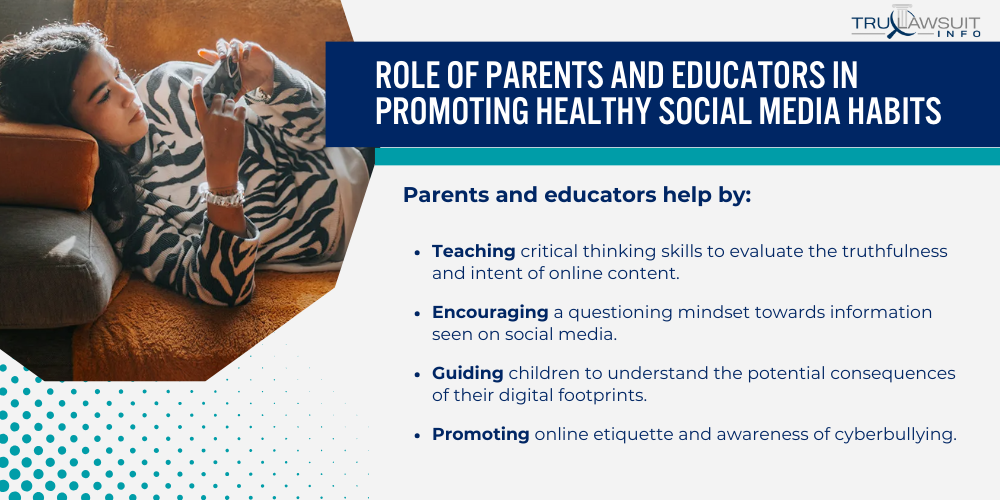
Importance of Digital Literacy and Media Education
Digital literacy and media education are vital in helping children navigate social media responsibly.
Parents and educators help by:
- Teaching critical thinking skills to evaluate the truthfulness and intent of online content.
- Encouraging a questioning mindset towards information seen on social media.
- Guiding children to understand the potential consequences of their digital footprints.
- Promoting online etiquette and awareness of cyberbullying.
Strategies for Monitoring and Limiting Social Media Use
Setting ground rules for social media use is a strategy that parents and educators can employ to help manage a child’s engagement on these platforms.
They can:
- Define specific times when social media is allowed and ensure it doesn’t interfere with sleep or family time.
- Use available tools and apps to monitor and set limits on how much time adolescents spend on social media.
- Keep open lines of communication about the content they encounter and the interactions they have.
- Model positive behavior through their own use of social media.
Understanding the impact of social media on children and teenagers better equips parents and educators with strategies for guiding them toward healthy habits.
Future Research and Policy Implications
The unfolding scenario of social media impacts necessitates focused studies and policy development to navigate its influence on society effectively.
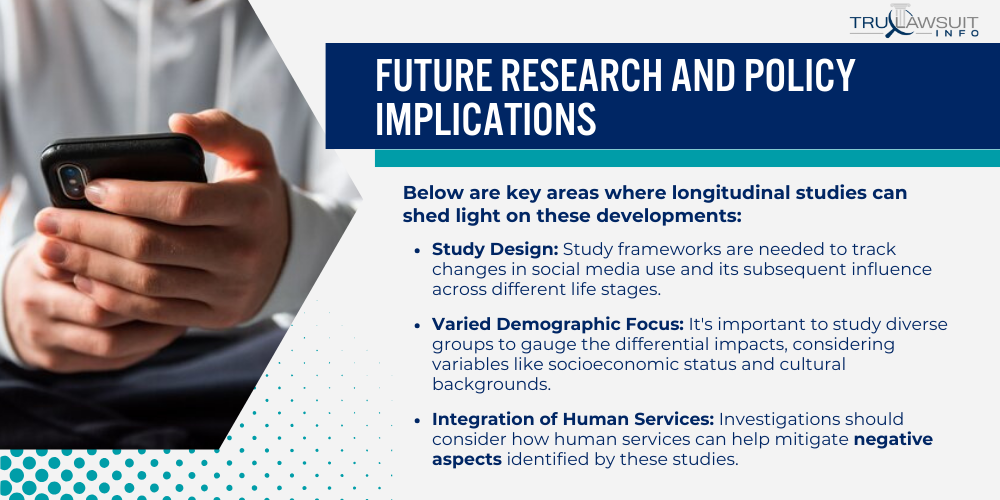
Need for Longitudinal Studies on Long-Term Effects of Social Media
Longitudinal studies play a vital role in understanding the progression and long-term effects of social media on individuals.
Existing research provides snapshots, but to truly comprehend the impact, one must look at how these effects evolve over time.
Below are key areas where longitudinal studies can shed light on these developments:
- Study Design: Study frameworks are needed to track changes in social media use and its subsequent influence across different life stages.
- Varied Demographic Focus: It’s important to study diverse groups to gauge the differential impacts, considering variables like socioeconomic status and cultural backgrounds.
- Integration of Human Services: Investigations should consider how human services can help mitigate negative aspects identified by these studies.
- Policy Development: Findings from longitudinal research ought to guide lawmakers in crafting relevant and preemptive policies.
Developing Guidelines for Age-Appropriate Social Media Use
The call for age-appropriate social media use guidelines underscores the need to protect younger users while fostering a healthy digital environment.
Here are the key elements that should be considered when developing such guidelines:
- Systematic Review of Current Use: This should inform the creation of guidelines that are relevant to the changing digital landscape.
- Policy Implications: Clear guidelines will support policy-makers in structuring regulations that safeguard young users.
- Educational Resource Development: Ensuring that information on age-appropriate use is accessible for parents, educators, and the youth.
- Continued Reassessment: As social media evolves, so should its usage guidelines to remain relevant and protective of younger audiences.
Frequently Asked Questions
-
How does social media affect interpersonal relationships within society?
Social media acts as both a bridge and a barrier in societal relationships.
It fosters connections by allowing individuals to stay in touch regardless of distance, but excessive use may lead to neglect of face-to-face interactions and potential misunderstandings due to a lack of physical cues.
-
What are the long-term psychological effects of social media usage on individuals?
Long-term use of social media is associated with several psychological effects.
Individuals may experience heightened levels of anxiety and depression linked to comparison and cyberbullying, while some benefit from supportive communities and a sense of belonging.
-
In what ways does social media consumption influence academic performance among students?
Studies suggest a correlation between social media use and students’ academic performance.
Excessive use can lead to distraction and reduced focus, but when utilized responsibly, social media can provide academic support and enriching educational content.
-
What notable shifts in consumer behavior can be attributed to social media marketing?
Social media marketing has significantly altered consumer behavior by enhancing brand engagement and facilitating peer recommendations.
Consumers now seek authenticity and personalization and often rely on social media for pre-purchase research and post-purchase feedback.
-
How have platforms for social media contributed to societal discourse and political engagement?
Social media platforms have become pivotal in shaping societal discourse by amplifying diverse voices and facilitating rapid information spread.
They are instrumental in mobilizing communities for political causes and have redefined pathways for civic engagement and activism.
-
Can you describe the correlation between social media use and body image perception among adolescents?
The relationship between social media and body image among adolescents is a growing concern.
Exposure to idealized body standards can lead to negative body image and self-esteem issues, while body-positive movements on social media work to counteract these pressures and promote acceptance.

Experienced Attorney & Legal SaaS CEO
With over 25 years of legal experience, Jessie is an Illinois lawyer, a CPA, and a mother of three. She spent the first decade of her career working as an international tax attorney at Deloitte.
In 2009, Jessie co-founded her own law firm with her husband – which has scaled to over 30 employees since its conception.
In 2016, Jessie founded TruLaw, which allows her to collaborate with attorneys and legal experts across the United States on a daily basis. This hypervaluable network of experts is what enables her to share reliable legal information with her readers!
Have A Case?
Here, at Tru Lawsuit Info, we’re committed to helping victims get the justice they deserve.
To do this, we actively work to connect them with attorneys who are experts in litigating cases similar to theirs.
Would you like our help?
Tru Lawsuit Info is a reliable source of information about issues that may affect your health and safety, such as faulty products, data breaches, and environmental hazards.
Our team of experienced writers collaborates with medical professionals, lawyers, and advocates to produce informative articles, guides, and other resources that raise awareness of these topics.
Our thorough research provides consumers with access to reliable information and updates on lawsuits happening around the country. We also can connect consumers with attorneys if they need assistance.
Camp Lejeune's water contamination issue spanned several decades starting in the 1950s. Exposure to these chemicals has been linked to various serious health issues, including cancer, organ diseases, and death.
Research is increasingly suggesting a link between the use of Tylenol during pregnancy and the development of neurodevelopmental disorders, such as autism and ADHD, in infants.
Legal action is being taken against manufacturers of Aqueous Film-Forming Foam (AFFF), a chemical used in fighting fires. The plaintiffs allege that exposure to the foam caused health issues such as cancer, organ damage, and birth and fertility issues.
Have A Case?
Here, at Tru Lawsuit Info, we’re committed to helping victims get the justice they deserve.
To do this, we actively work to connect them with attorneys who are experts in litigating cases similar to theirs.
Would you like our help?







